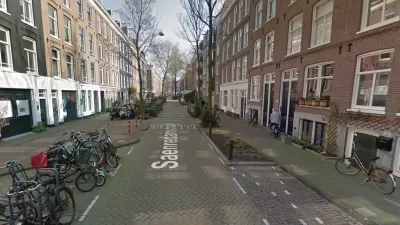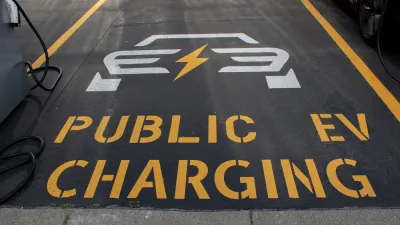The Victoria Transport Policy Institute has released this report to guide municipalities to transition from 'free' parking (though author Todd Litman is quick to point out that it is never free) to charging for parking directly.
There are numerous economic and environmental benefits reaped when parking is charged for directly rather than keeping the price free and paying for it indirectly. This guide was written to enable governments to overcome obstacles and accrue the benefits with parking pricing.
From Summary:
"Parking pricing (also called user pay and metered parking) refers to direct charges for using a parking space. Efficient parking pricing can provide numerous benefits including increased turnover and therefore improved user convenience, reduced traffic problems, and increased revenues.
This report provides guidance on parking pricing
implementation. It describes...ways to overcome common
obstacles and objections, and examples of successful parking pricing programs."
From Introduction:
"Parking is never really free, the choice is really between paying directly or indirectly for parking facilities. Underpricing increases the amount of parking needed to meet demand, and tends to increase problems such as traffic congestion, housing inaffordability, sprawl and pollution.
Charging users directly for parking tends to be more efficient and equitable, and generates revenues that can finance new services or reduce taxes and rents..."
Thanks to Todd Alexander Litman
FULL STORY: Parking Pricing Implementation Guidelines...(PDF)

Trump Administration Could Effectively End Housing Voucher Program
Federal officials are eyeing major cuts to the Section 8 program that helps millions of low-income households pay rent.

Planetizen Federal Action Tracker
A weekly monitor of how Trump’s orders and actions are impacting planners and planning in America.

The 120 Year Old Tiny Home Villages That Sheltered San Francisco’s Earthquake Refugees
More than a century ago, San Francisco mobilized to house thousands of residents displaced by the 1906 earthquake. Could their strategy offer a model for the present?

HSR Reaches Key Settlement in Northern California City
The state’s high-speed rail authority reached an agreement with Millbrae, a key city on the train’s proposed route to San Francisco.

Washington State Legislature Passes Parking Reform Bill
A bill that would limit parking requirements for new developments is headed to the governor’s desk.

Missouri Law Would Ban Protections for Housing Voucher Users
A state law seeks to overturn source-of-income discrimination bans passed by several Missouri cities.
Urban Design for Planners 1: Software Tools
This six-course series explores essential urban design concepts using open source software and equips planners with the tools they need to participate fully in the urban design process.
Planning for Universal Design
Learn the tools for implementing Universal Design in planning regulations.
Ada County Highway District
Clanton & Associates, Inc.
Jessamine County Fiscal Court
Institute for Housing and Urban Development Studies (IHS)
City of Grandview
Harvard GSD Executive Education
Toledo-Lucas County Plan Commissions
Salt Lake City
NYU Wagner Graduate School of Public Service





























